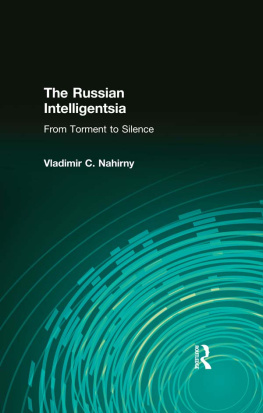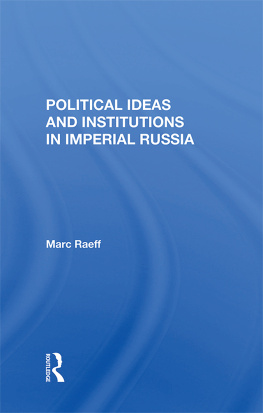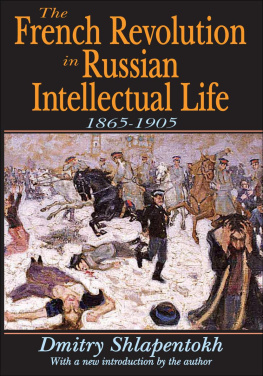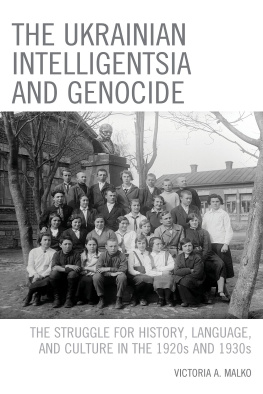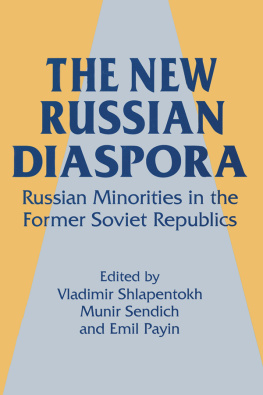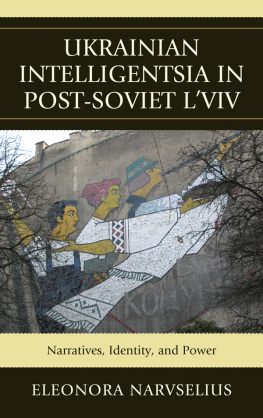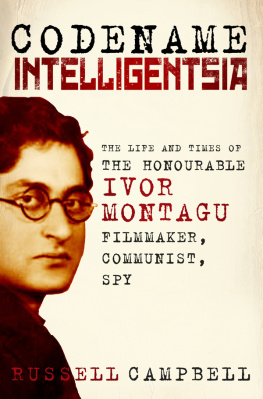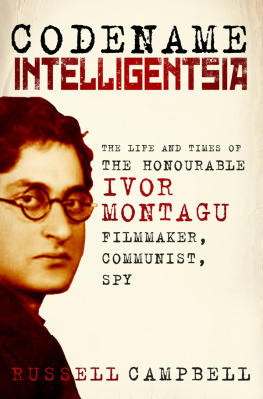The Russian Intelligentsia
The Russian Intelligentsia
From Torment to Silence
Vladimir C. Nahirny
First published in paperback 2018
by Routledge
711 Third Avenue, New York, NY 10017
and by Routledge
2 Park Square, Milton Park, Abingdon, Oxon OX14 4RN
Routledge is an imprint of the Taylor & Francis Group, an informa business
2018 Taylor & Francis
The right of Vladimir C. Nahirny to be identified as author of this work has been asserted by him in accordance with sections 77 and 78 of the Copyright, Designs and Patents Act 1988.
All rights reserved. No part of this book may be reprinted or reproduced or utilised in any form or by any electronic, mechanical, or other means, now known or hereafter invented, including photocopying and recording, or in any information storage or retrieval system, without permission in writing from the publishers.
Trademark notice: Product or corporate names may be trademarks or registered trademarks, and are used only for identification and explanation without intent to infringe.
First published 1983 by Transaction Publishers
Library of Congress Cataloging-in-Publication Data
Nahirny, Vladimir C., 1928
The Russian intelligentsia.
Includes bibliographical references.
1. IntellectualsSoviet Union. 2. Soviet UnionIntellectual life.
1. Title.
HM213.N34 305.5520947 82-4796
ISBN: 978-0-87855-463-8 (hbk)
ISBN: 978-1-4128-6532-6 (pbk)
ISBN: 978-1-351-31864-8 (ebk)
Acknowledgments
No words of acknowledgment can fully convey the debt I owe to my teacher, Professor Edward Shils of the University of Chicago, to whom this book is gratefully dedicated. Without his sustained attention, encouragement, and counsel this book would not have been written. Professors Daniel Bell and Richard Pipes of Harvard University, and Professor Michael Confino of the University of Tel-Aviv, have been kind enough to read the manuscript and to offer invaluable suggestions and criticisms. Thanks are also due to Professor John Cuddihy of Hunter College for his incisive comments on the manuscript. The staff of Transaction, Inc. has been most helpful and cooperative. I am particularly grateful to Professor Irving L. Horowitz for his supportive reading of the manuscript, and Ms. Kerry Kern for her fine editorial assistance. It seems hardly necessary to add that I alone am responsible for the views expressed and conclusions reached in this study.
I am indebted to the editors of American Journal of Sociology and Comparative Studies in Society and History for permission to use in a revised form some material that has appeared in articles in their journals.
The intelligentsia cannot but be conscious of its imperfect, halfway situation; there must be at least a vague realization of this. If the intelligentsia closes itself off, withdraws into some idea or dogma, it begins to disappear, to be effaced. In the end, all ideological rivers flow into the swamp of philistinism: some in a direct, simple fashion, others after shelves and waterfalls, asceticism and quixotism. Having ceased to be a working hypothesis, the idea becomes an idol. It is to this idol that man is sacrificed.
The intelligentsia cannot pass by political events which touch its moral sense, but in submerging itself in politics, it loses itself and becomes a political counterelite, inside-out bureaucracy.
This happens very simply. A situation that gives birth to cowards also gives birth to heroes. The heroes, having entered the battle against despotism, come to the conclusion that everything is permitted for them in their holy battle. It is for this reason that fighters for freedom become accustomed to consider themselves above the law and middle class morality. Having achieved power, they easily take up the executioners axe and continue the tradition against which they themselves rebelled.
G. Pomerantz
Man Without an Adjective
Having got over one bout of enthusiasm, Nerzinwhether definitively or notunderstood the people in a new way, a way he had not read about anywhere; the people is not everyone who speaks our language, nor yet the elect marked by the fiery stamp of genius. Not by birth, not by the work of ones hands, not by the wings of education is one elected into the people.
But by ones inner self.
Everyone forges his inner self year after year. One must try to temper, to cut, to polish ones soul so as to become a human being.
Aleksandr I. Solzhenitsyn
The First Circle
And it was with tragic clarity that the sacred law of all life defined itself: freedom of the individual human being is higher than anything else, and there is no goal, no purpose in the world, for which it may be sacrificed.
Vasily Grossman
Forever Flowing
Introduction
The Russian intelligentsia has been examined from a variety of historical perspectives. It would not be putting the matter too strongly to say that most of the studies of the intelligentsia have been historical in orientation. The specific subjects of these studies range from the origin of the intelligentsia, to the nature of its significance, to the use of the term itself. But the major concern of the literature on the intelligentsia has been the ideas and ideals held by various groups of the intelligentsia, often combined with the life histories of their members. With scarcely an exception, therefore, this literature represents a mixture of intellectual history and biography.
The present work is not intended to be another history of the intelligentsia. Rather, it is an effort to develop a sociological perspective on the intelligentsia. Although it covers some of the same ground that one would find in a historical account of the intelligentsia, it is far from that. What this study seeks to accomplish is at once narrower and broader: narrower in that it deals in a persistent fashion with one major problemthe ideologization of the intelligentsia; broader in that it examines this problem with an eye to constructing a conceptual framework vital to the sociology of ideologically based relations and groups. In this sense, then, the present study may be said to offer a conceptually focused view of the intelligentsia as a distinct type of social group. No interpretive scheme presently available to sociology can account plausibly for the nature of the relations that characterize social groups whose members orient themselves to one another in terms of some central symbolsbe they those of Zion, patrie, Volk, narod, or proletariat. The very fact that sociologists still tend to place these groups on the continuum of Gemeinschaft and Gesellschaft

